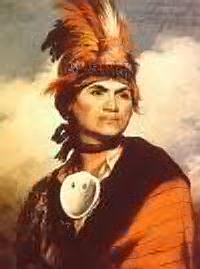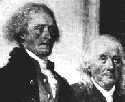 A friend forwarded the following message to me:
A friend forwarded the following message to me: A friend forwarded the following message to me:
A friend forwarded the following message to me:
from bondage to spiritual faith;
from spiritual faith to great courage;
from courage to liberty;
from liberty to abundance;
from abundance to selfishness;
from selfishness to complacency;
from complacency to apathy;
from apathy to dependency;
from dependency back again to bondage.
To that I can only say: What a conservative crock.
This is Anglo-American myth-making at its most egregious. Most civilizations start with greed, folly, and suffering, not more noble sentiments. Let's look at an example we're all familiar with, America:
Doesn't sound like a perfect record of faith, courage, and liberty when you put it that way, hmm? Miguel de Cervantes, of all people, summed up America nicely when he described it as:
The recourse of the ruined, the refuge and shelter of the desperate men of Spain, the sanctuary of the fraudulent bankrupts, the pardon of murders, the haven of loose women, the last trick of gamblers, the common cheat of many and the remedy of few.
Others agree. In his review of Freedom Just Around the Corner by Walter A. McDougall, Gordon S. Wood describes the nature of Americans (NY Times, 3/28/04):
Americans, according to McDougall, have always been scramblers, gamblers, scofflaws and speculators. Nearly everyone in early America, it seems, wanted to know not what's good for the English crown or the colony or the nation, but "what's in it for me." Of course, there were honest righteous people, religious and high-minded people, who spoke out against excesses and abuses. But their idealistic voices only made Americans feel good about themselves without seriously diminishing the overall scramble for profit.
Democracy in action
One glaring flaw in Tytler's quote is his confusion between democracies and civilizations. So what if "the average age of the world's great civilizations has been 200 years?" How many of those great civilizations were democracies? No doubt many of them failed because they weren't democracies, which makes the statistic irrelevant to Tytler's thesis.
Democracy has a fine track record once it takes root. Iceland's democracy has lasted 800 or 900 years. Switzerland's has lasted several hundred years. The English and American models have lasted a couple hundred years each.
True, the Golden Age of Pericles didn't last long. But one could argue that Greek civilization extended from the Mycenaean era to the Hellenic era of Alexander the Great and beyond—perhaps to the fall of Constantinople. The culture persisted even if its government didn't.
Meanwhile, the ancient Egyptian and Chinese civilizations each lasted a couple thousand years. What does that tell us? That dictatorships and democracies both can last for centuries? Or that dictatorships last the longest? Should we emulate Egypt and China and establish rule by a despot?

United we stand....
Tytler was asserting the Anglo-American myth of self-reliance—that rugged individuals make it in the world, while those who need aid and succor don't. It's an attitude that would be right at home in today's conservative movement. It's based on a falsification of history.
If democracy "can only exist until the voters discover that they can vote themselves largess from the public treasury," the United States must be doomed. Because Americans have voted themselves largess from the beginning. One of the biggest myths around is that we the people have opposed government and its aid until recently.
The United States wasn't born because the Founding Fathers hated government. It was born because they wanted their own government. It succeeded because they worked collectively, not individually. They depended on each other and on other nations, notably France, whom they begged for charity.
Both Ben Franklin and Thomas Jefferson had limited views of the scope of private property. Neither one had much sympathy for pure libertarianism. Let's hear them in their own words.
From Bruce E. Johansen's Forgotten Founders on Ben Franklin:
All property, indeed, except the savage's temporary cabin, his bow, his matchcoat and other little Acquisitions absolutely necessary for his Subsistence, seems to me to be the creature of public Convention. Hence, the public has the rights of regulating Descents, and all other Conveyances of Property, and even of limiting the quantity and uses of it. All the property that is necessary to a man is his natural Right, which none may justly deprive him of, but all Property superfluous to such Purposes is the property of the Public who, by their Laws have created it and who may, by other Laws dispose of it.
And from the same work on Thomas Jefferson:
Views such as these pointed the way for a progressive view of government—which Jefferson's Democrats spearheaded, despite Jefferson's populist bent. His Louisiana Purchase was probably the biggest government gift to American citizens until...I don't know when. Hamilton's Federalists were even more government-minded. They believed in federal taxation—"...the federal government must of necessity be invested with an unqualified power of taxation in the ordinary modes" (Hamilton, Federalist No. 31)—and created the first national bank to help regulate the economy.
 Guns...a good example
Guns...a good example
Surely private gun ownership is an example of how Americans originally brooked no government interference. As one book reviewer wrote, "The image of the citizen-soldier taking up his musket to defend his home and community is so deeply ingrained as to seem axiomatic. Even most who advocate repealing the 2nd Amendment assume that it originated at a time when a musket hung over every mantel."
But as a new book, Arming America: The Origin of a National Gun Culture by Michael A. Bellesiles, demonstrates, that just ain't so. From the LA Times's review, 9/17/00:
...Bellesiles denies the accuracy of those deep-rooted assumptions, marshaling evidence to demonstrate that early Americans in fact owned comparatively few guns and seldom used them effectively. Expensive, hard to maintain and often unsafe, the unrifled muskets of the 17th and 18th centuries made poor hunting arms; most were military weapons that colonial governments distributed to militiamen. Virtually all were imports.
Because "those eligible for militia duty" in most colonies were free white Protestant men between 16 and 50 years of age..., this level of gun ownership suggests that on the eve of the Revolution, no more than about 4% of colonists were armed. Formal arms censuses conducted by the federal government in the early 19th century show that this modest level of gun possession was slow to rise, if indeed it rose at all. In 1803, the United States had enough weapons to arm 4.9% of its white citizens; in 1810, 4.3%; in 1820, 4.7%. (The 1830 census showed that the level had fallen to 3%.)
[Bellesiles] argues that the federal government was the single greatest advocate of an armed population and that it did everything it could to promote an arms manufacturing industry in the first half of the 19th century. This stemmed in part from the desperate need for self-sufficiency in national defense. The Revolutionaries had faced critical shortages of guns and ammunition in 1775 and 1776 and could never have held out against the British army without massive transfusions of French muskets, lead and powder.
Imagine that. A citizenry that couldn't even defend itself unless the government gave it weapons. Talk about your basic lack of self-reliance.
Note: Historians have criticized Bellesiles's book for his shoddy or undocumented data collection methods. From what I've read of these critiques, they implicate other parts of Bellesiles's thesis, but not what's written above. Therefore, I've left his arguments in place.
A nation of laws...lots of them
As the nation grew, did people become less reliant on government? Hardly. Here's a commentary adapted from the University of Chicago Magazine, April 1998:
William J. Novak had garnered acclaim and serious attention for his assertion that the prevailing view upholding 19th-century America as a folkloric golden age of small government, unfettered individual rights, and laissez-faire economics is sheer myth.
"I had always learned the old story that American regulatory history begins with the shift from a laissez-faire approach to the modern welfare state in the 20th century," says Novak. "But I kept uncovering 19th-century precedents in every area of regulation. I don't see a period from the mid-18th century to the present in which government and public policy weren't playing a key role in economic and social life."
Awarded the Littleton-Griswold prize by the American Historical Association as 1997's best book on law and society, "The People's Welfare" presents reams of 19th-century municipal, state, and federal laws that sought to affect the economy, the use of public spaces, social and cultural conditions, and public health and safety.

Wrote University of California law professor Reuel Schiller in "Reviews in American History": "If...any historical evidence can destroy the myth of the stateless 19th-century, it is in this book."
"Welfare" includes a list drawn up by the Illinois legislature in 1837 of 34 governmental powers that granted the fledgling city of Chicago the authority to prevent obstructions in public waterways, to restrain and prohibit gaming, to regulate the sale of spirits, to oversee the management of slaughterhouses, and to enforce a range of other rules.
In one of numerous similar examples, Novak points out how, as early as 1801, New York's legislature regulated lotteries, guns, rents, ferries, attorneys, and lumber inspections.
Novak's conclusions have implications for today's political debates. As one book reviewer noted, Novak's views, though supported by exhaustive research, "will come as heresy to any politician who got into office, or is trying to get there, on the usually reliable platform that the liberals, the do-gooders, the good-government crowd, and the meddlers have invented an overbearing and intrusive government of a kind we never had before."
Although historian Novak refrains from taking a political stance on whether regulation is good or bad for the country, he goes so far as to warn that reliance on references to a golden age of statelessness represent, at best, a simplistic way of viewing history and, at worst, a disingenuous appraisal of American governance history.
When were all the laws passed regulating whom you could marry (not blacks), when you could open your store (not on Sunday), even where and when you could spit? Since the 1960s and the advent of the "nanny state"? No, in the "libertarian" 19th century.
Welfare for the West
What about the settling of America's so-called Wild West? Surely that was accomplished by John Wayne types who disdained the help of their fellow men? Nope. From the LA Times, 9/3/00:
In the never-matched formulation of Bernard de Voto, the West's response to the feds has been: "Get out, and give us more money."
In many ways, the federal government has given the West vital money and support, and the West has given, in return, a hearty and sustained supply of resentment. The reasons for this are hardly mysterious. The attitudinal workings of teenagers provide a useful model: They are deeply dependent on their parents and that often makes them deeply resentful of their parents.
The territory distributed via the Homestead Act and railroad land grants was perhaps the biggest government welfare program ever. Unfortunately, the Indians already owned the land through treaty rights and legislation. How Government Shaped the West explains how the government made Westward expansion possible by eliminating the Indians as a factor.

The pattern continued as cattlemen and sheep men beseeched government bodies to back their claims on rangeland. Ranchers, miners, and loggers paid pennies for water, grazing, and mineral rights worth many times more. Many of these 19th-century giveaways are still in effect, and these freeloaders are still grabbing public resources for a fraction of their value.
And when these hardy individuals overgraze a range, clearcut a forest, or strip-mine a mountain, do they take responsibility and rectify the destruction they caused? Do five-year-olds voluntarily clean up their rooms? No. After destroying topsoil and dumping toxic waste, these "self-reliant" Westerners leave it to the government to straighten up their mess.
Want a good example of Western (and American) dependence today? Watch a forest fire burn out of control. The demands for government assistance during the fire, government relief after the fire, and better forest management by government before the next fire will singe your ears.
Bailouts for Western homeowners
The Western fires of 2002 nicely prove the point. An excerpt from A Dream That Dares Disaster explains how Westerners react to such hardships. From the LA Times, 7/7/02:
Fire sweeping through Western forests and grasslands is the oldest story both in and outside town. It's a story that began long before rural subdivisions spread into the forests.
Before we had the federal government and aggressive fire protection to blame for our troubles, Indians often watched smoke fill the air as trees and grasses burned. Sometimes lightning started the fires; sometimes the Indians used fire to encourage conditions more favorable to game. Either way, the Western forests burned. Combine lots of biomass (aka, plants) with an arid or semiarid climate and fire is an entirely predictable feature of regional life. Yet an unwillingness to let the recognition of risk restrict individual freedom is an equally predictable feature of Western life. In the summer of 2002, these two dynamics have collided: Never before have so many Western homes been located, voluntarily and even willfully by their builders and owners, in the line of fire.
At the core of the Western dream is an individual who insists on making his own choices and refuses petty regulation. The Western landscape is rugged and tough, but the Westerner is more rugged—and tougher. He settles where he wants to and lives according to his own, self-reliant terms.
Until, that is, he needs help.
The Western dream has a golden parachute, a bail-out sequence, an escape clause and an exit plan. Pioneers intruded into Indian territory, and when they got themselves into a mess, the Army arrived to protect them and remove the Indians. Farmers tried to grow crops in places with low rainfall, and the U.S. Bureau of Reclamation built the dams and reservoirs that filled in for the rain. Homeowners wanted to live in houses with stunning views, and counties built the roads and supplied the services to make these sites accessible and livable.
Western risk-taking has often relied on this back-up plan: We get ourselves in a pinch and the government—local, state and federal—rushes to get us out of it. Nature presents challenges that are at once dangerous and appealing, but human ingenuity and government funding quickly drain the danger out of these challenges and leave only their appeal.
So much for self-reliance
Tytler's complaint is like that of so many Americans today. People sue because they aren't getting their fair share of the pie. Corporations are capitalists in good times and socialists when they're in trouble, actor/activist Tim Robbins once said. Conservatives want to slash government funding—except in the case of defense, security, agriculture, school testing, and religous subsidies.
Ever since about 1980, we've become a nation of self-centered whiners. "Boo-hoo!" wail all those who complain. "They're getting 'largess' and I'm not. My special interests are what matter, not theirs!"
It takes more than self-reliance to make a country. It takes a village, not a collection of individuals working at selfish cross-purposes. People from the Hopi and Osage Indians in the US to the natives of West Africa have recognized this truism. Let's hope Anglo-Americans catch on someday.
More on the myth of American self-reliance
Westerners = freeloaders
Palin the typical American
Related links
Are taxes "theft"?
Government gives, free markets take
Gingrich flunks "American Culture"
Right-wing extremists: the enemy within
America's cultural mindset
|
. . . |

|
All material © copyright its original owners, except where noted.
Original text and pictures © copyright 2007 by Robert Schmidt.
Copyrighted material is posted under the Fair Use provision of the Copyright Act,
which allows copying for nonprofit educational uses including criticism and commentary.
Comments sent to the publisher become the property of Blue Corn Comics
and may be used in other postings without permission.